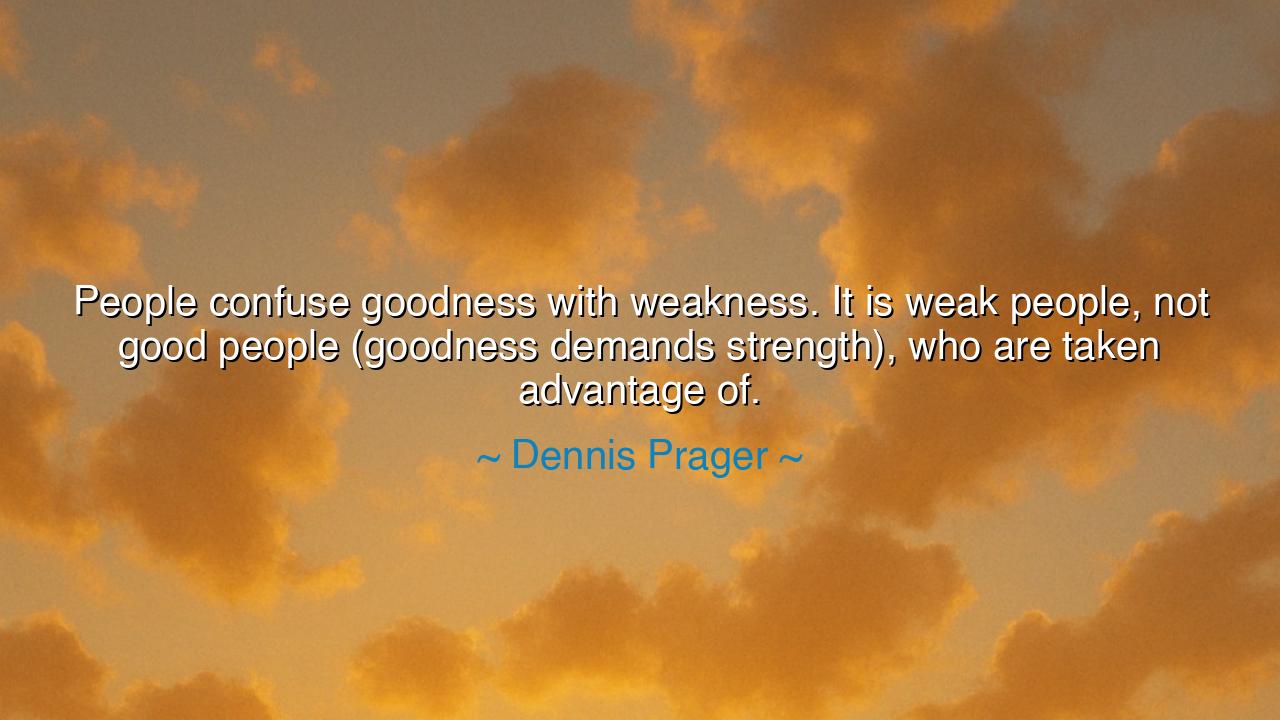
People confuse goodness with weakness. It is weak people, not
People confuse goodness with weakness. It is weak people, not good people (goodness demands strength), who are taken advantage of.






Dennis Prager’s words, “People confuse goodness with weakness. It is weak people, not good people (goodness demands strength), who are taken advantage of,” strike like a hammer upon the anvil of truth. He reminds us that to be good is not to bow, not to yield blindly, not to lack courage. Rather, goodness is a fire that must be guarded by strength, for without strength it becomes a hollow shell, easily shattered by the will of the cruel. To live in true goodness is to live with a backbone of steel and a heart of mercy.
The origin of this wisdom lies in the confusion of ages. Many believe that to be gentle is to be fragile, that to be kind is to be defenseless. Yet Prager reveals that this is an illusion. True goodness is not passive submission but an active, disciplined force that chooses virtue despite the temptation to act otherwise. A weak person may yield to every demand and every manipulator, but the good person stands firm, rooted in principle, unwilling to betray justice for ease.
History reveals this truth through the example of Winston Churchill during the Second World War. In the face of tyranny, many counseled appeasement, urging him to bow to Hitler’s growing power. It might have seemed "kind" to avoid conflict, but that was not true goodness—it was weakness. Churchill’s strength made possible the defense of freedom, and his unyielding stand against evil proved that goodness, when clothed in courage, can preserve nations. Had he confused kindness with passivity, the world might have been swallowed in darkness.
Another example is found in the life of Harriet Tubman, who risked her own life repeatedly to lead enslaved men and women to freedom through the Underground Railroad. She was compassionate, deeply good, but never weak. Her goodness demanded strength—to endure hunger, cold, danger, and betrayal. She was not taken advantage of; rather, she became a shield for the oppressed. In her, we see that true goodness is a force of liberation, not a posture of helplessness.
This teaching carries a warning. If you mistake weakness for virtue, you open the door for the wicked to trample upon you. Weakness invites exploitation, because it cannot resist. But goodness, girded with courage, confronts exploitation and refuses to allow injustice. The good man or woman must therefore cultivate both tenderness of heart and strength of will. Only in that balance can goodness endure in a world where cruelty is ever eager to exploit the soft.
For those who live in the present age, the path is clear: do not let others shame you into believing that to resist evil is unkind. Do not think that to defend truth makes you less compassionate. On the contrary, your compassion will be meaningless unless you have the strength to protect it. True goodness is not cowardice dressed as humility—it is a noble fire that refuses to go out.
In your life, practice this lesson by setting boundaries where others would exploit you. Be generous, but not gullible. Be kind, but not blind. When injustice rises, oppose it firmly. When manipulation whispers, answer with truth. Train your character as a warrior trains the body: to be steady, unbreakable, unyielding in the face of pressure.
Thus let the teaching of Prager endure: goodness demands strength. Weakness is not goodness, but a shadow that cannot stand against the wind. Be strong, therefore, and be good—not for yourself alone, but for the protection of all who depend upon the shield of the righteous. In this way, you will not be taken advantage of, but will become a guardian, a light, and an example for the generations to come.






AAdministratorAdministrator
Welcome, honored guests. Please leave a comment, we will respond soon